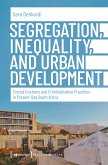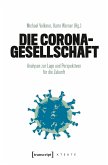In present-day South Africa, urban development agendas have inscribed doctrines of desirable and undesirable life in city spaces and the public that uses the space. This book studies the ways in which segregated city spaces, displacement of people from their homes, and criminalization practices are structured and executed. Sara Dehkordi shows that these doctrines are being legitimized and legalized as part of a discursive practice and that the criminalization of lower-class members are part of that practice, not as random policing techniques of individual security forces, but as a technology of power that attends to the body, zooms in on it, screens it, and interrogates it.
Dieser Download kann aus rechtlichen Gründen nur mit Rechnungsadresse in A, D ausgeliefert werden.









